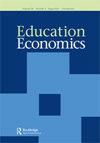高等教育中的种族配额与大学前学习成绩:来自巴西的证据
IF 0.9
Q3 Social Sciences
引用次数: 0
摘要
本文章由计算机程序翻译,如有差异,请以英文原文为准。
Racial quotas in higher education and pre-college academic performance: evidence from Brazil
ABSTRACT The effects of affirmative action on the incentives to human capital accumulation are ambiguous from a theoretical perspective and the scarce empirical evidence on the matter provides mixed results. In this paper, we address this issue by investigating the impacts of Brazil’s Law of Quotas on the students’ performance in the college entrance exam, the ENEM. We provide causal evidence that the law fostered incentives to pre-college human capital accumulation, inducing students to attain higher ENEM scores. Moreover, the effects of the quotas were greater in quantitative-intensive subjects and these impacts increased throughout the first years after the law’s implementation.
求助全文
通过发布文献求助,成功后即可免费获取论文全文。
去求助
来源期刊

Education Economics
EDUCATION & EDUCATIONAL RESEARCH-
CiteScore
2.00
自引率
8.30%
发文量
38
期刊介绍:
Education Economics is a peer-reviewed journal serving as a forum for debate in all areas of the economics and management of education. Particular emphasis is given to the "quantitative" aspects of educational management which involve numerate disciplines such as economics and operational research. The content is of international appeal and is not limited to material of a technical nature. Applied work with clear policy implications is especially encouraged. Readership of the journal includes academics in the field of education, economics and management; civil servants and local government officials responsible for education and manpower planning; educational managers at the level of the individual school or college.
 求助内容:
求助内容: 应助结果提醒方式:
应助结果提醒方式:


